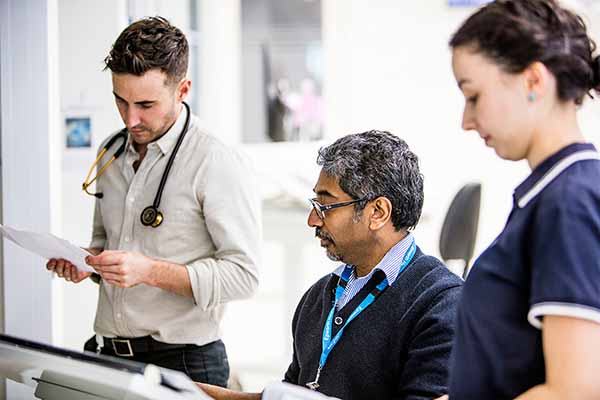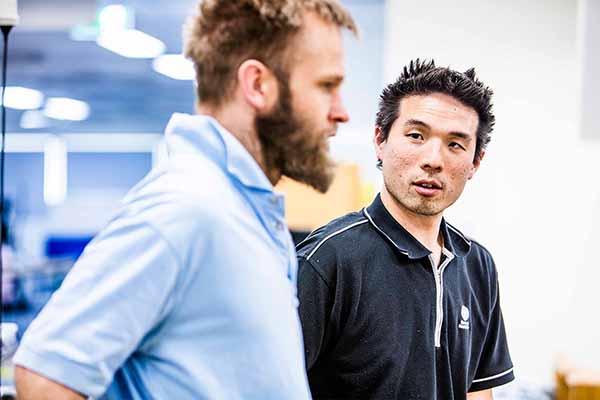Overview
Kidney cancer at Epworth
Epworth specialises in the treatment of kidney cancer, with many of Australia's leading urologists practising at Epworth. Our oncology team is here to support you through your diagnosis, treatment and recovery.
Fact sheet | What is kidney cancer? | Epworth
-
What is kidney cancer?
Kidney cancer is when cancerous cells (such as tumours) begin to grow in the kidney.
-
What are the types of kidney cancer?
Kidney cancer typically only affects one kidney, and there are several types of kidney cancer.
Types of kidney cancer:
- Renal cell carcinoma
Renal cell carcinoma is the most common type of kidney cancer where cancerous cells grow in the tubules of the kidney. - Wilms tumour
Wilms tumour is rare but more likely to be diagnosed in younger children. - Urothelial carcinoma
Urothelial carcinoma, also known as transitional cell cancer, is a rare kidney cancer where cancerous cells form in the renal pelvis and ureter.
- Renal cell carcinoma
-
What causes kidney cancer?
Factors that may put you at higher risk of developing kidney cancer include:
- Age
- Smoking
- Men are more likely than women to develop kidney cancer
- Being overweight
Signs and symptoms of kidney cancer
If you have noticed a change, book a consultation with your GP as soon as possible. Catching cancer quickly can save your life.
Symptoms and signs
It's natural and common for changes to occur to your body as you age or go through stressful periods. However, we encourage you to recognise what is normal for your body and if changes are persistent consult your GP for peace of mind.
Signs and symptoms of kidney cancer can include:
- Blood in your urine
- Lower back pain
- Fatigue
- A fever that is not caused by an infection and that does not go away
Notice changes and act quickly
Diagnosing kidney cancer
Screening for kidney cancer
A screening test allows a doctor to routinely check for types of cancer. Unfortunately, there is currently no screening test for kidney cancer.
How is kidney cancer diagnosed?
Epworth provides you with access to several thorough diagnostic tests to further investigate signs and symptoms of kidney cancer.
To investigate your health concerns, your urologist or doctor may schedule one or several of the following kidney cancer tests:
Blood and urine tests
Though blood tests are not a diagnostic tool for kidney cancer, blood tests may be scheduled by your doctor during your first consultation to check your overall kidney, blood, and liver health.
Biopsy
A biopsy is the removal of a small piece of tissue that will be examined under a microscope. Your doctor may request that you undergo a biopsy to determine whether you have kidney cancer.
Imaging tests
Depending on symptoms, your doctor and care team may schedule imaging tests to assess or diagnose your cancer. Each imaging test provides your care team with a different view of your body, some common scans for kidney cancer include an ultrasound, CT or MRI.
Staging - Investigating the extent of the cancer
If you are formally diagnosed with kidney cancer, your Epworth team will schedule additional tests to stage the cancer. These tests will allow your care team to establish your cancer as stage 1 to 4.
Staging helps your care team and specialists to create a unique treatment plan.
What does my cancer stage mean?
Staging is a term used to describe the size of the cancer and whether it has spread. Staging helps your care team and specialists to create a unique treatment plan.
Stage 1
The cancerous tumour is relatively small and the cancer has not yet spread to other tissue.
Stage 2
Cancerous tumours remains relatively localised but has spread to nearby tissue beyond its origin.
Stage 3
Cancer has spread regionally and affected surrounding tissue, and may have grown.
Stage 4
Sometimes called advanced cancer, stage 4 means cancer has spread to other tissue or organs beyond the region where it originated.
Find your Epworth specialist
Treatment for kidney cancer
We understand that treatment options can be overwhelming. Epworth oncologists and specialists are here to guide and support you to make the best choice for your health.
Kidney cancer treatment at Epworth
Following a diagnosis of kidney cancer, your oncologist and cancer care team will create a tailored treatment plan, specific stage, and type of cancer. Your Epworth specialist will discuss these options with you and consider your circumstances, the size and location of cancer and your preferences.
Surgery
Depending on the kidney cancer stage, your care team may recommend one of two forms of kidney cancer surgery:
- Radical nephrectomy: radical nephrectomy involves the removal of the infected kidney.
- A partial nephrectomy: a partial nephrectomy is provided to patients who have small tumours. A partial nephrectomy includes the removal of part of the infected kidney.
Active surveillance
If the cancerous tumours are quite small, your care team may recommend active surveillance to avoid riskier treatment options. Depending on your circumstances, you may undergo tests every three to 12 months to ensure the cancer has not progressed.
Immunotherapy and targeted therapy
Immunotherapy and targeted therapy may be recommended for some types of kidney cancer.
Immunotherapy improves your immune system’s ability to fight cancer cells. Targeted therapy involves drugs that target features of cancer cells to stop them growing.
Radiotherapy and chemotherapy
Radiotherapy and chemotherapy are not effective forms of primary treatment for kidney cancer but may be used under specific circumstances.
Why choose Epworth for cancer care?
Epworth HealthCare is Victoria's largest not-for-profit private hospital group, renowned for excellence in diagnosis, treatment, care and rehabilitation. Epworth is an innovator in Australia’s health system, embracing the latest in evidence-based medicine to pioneer treatments and services for our patients.
Supported by excellent facilities, we integrate clinical practice with education and research to deliver outstanding patient care, each and every day.
Epworth cancer care locations
Epworth Rehabilitation
Kidney cancer care locations:
Kidney cancer rehabilitation
Rehabilitation doesn't just start after your treatment has ended. You may benefit from our holistic rehabilitation programs at any time throughout your cancer journey. Our programs support you to physically and emotionally prepare for treatment or restore your strength and wellbeing.
Who is the program for?
Rehabilitation doesn't start after your treatment has ended. You may benefit from our holistic rehabilitation programs at any time throughout your cancer journey. Our programs can support you to physically and emotionally prepare for treatment and restore your strength and wellbeing.
What does the cancer rehabilitation program involve?
Before you start
You will meet a rehabilitation doctor and allied health team for a medical, psychosocial, and physical assessment.
Everyone's cancer care journey is different. The assessments will help the team understand your specific needs to develop the right program for you. You will work with the team to develop goals to work towards throughout the program.
During the program
Depending on your assessment and individual needs, you may complete your program:
- as part of a group, with other people, who have been diagnosed with varying cancers
- on your own
Most people will attend as an outpatient, coming to hospital for a few hours once or twice a week, over several weeks. Some people may need to stay overnight in hospital and complete a program over several consecutive days.
Either way, you will receive the same support from our team to address your physical, functional and emotional needs.
Your program may include:
- A physical exercise component to help restore movement, strength and fitness
- An educational component where you will learn about different areas associated with your cancer diagnosis and treatment and how to manage them, including:
- fatigue
- pain
- emotional wellbeing
- body image and self-esteem
- work or family challenges
- relationships
- late-onset of side effects.
At the end of your program
Our rehabilitation team will keep in touch with your referring doctor and/or treating team throughout the program and our team will keep them informed about your progress.
They will also connect you to local services and support networks so you can leave our program with the strength and confidence to live life to your fullest potential.
Who will support me during the rehabilitation program?
Depending on your needs, you may see some or all of our multidisciplinary team which includes:
- Rehabilitation specialist doctor
- Cancer nurse
- Exercise physiologist
- Physiotherapist
- Psychologist
- Social worker
- Occupational therapist
- Dietitian.
How can I access a rehabilitation program?
Referrals
A referral from your specialist or GP is required to participate.
Ask your doctor to complete the referral form at www.epworth.org.au/rehab and return it to us via fax: 03 9982 6696 or email: [email protected]
Locations
Group programs are located at Epworth Camberwell and Epworth Hawthorn.
Individual programs can be accessed at Epworth Brighton, Epworth Camberwell, Epworth Geelong, Epworth Hawthorn or Epworth Richmond Rehabilitation.
Contact us
If you have any questions about our cancer rehabilitation programs, call us on: 1300 345 600.
Life after kidney cancer treatment
Following treatment, you may feel excited, anxious, or depressed. Life after kidney cancer treatment can pose its own challenges but our Epworth specialists are here to support you.
Remember that:
- You may still feel fatigued for a while after finishing treatment.
- If required, make an advanced care plan.
- Ask for help. If your body has changed due to treatment, remember help is out there to support you to feel your best and regain your sense of identity and self-esteem. Speak with your care team about options to support your general wellbeing after treatment.
Follow-up appointments
Epworth patients in remission for kidney cancer will likely need follow-up appointments to ensure abnormal cells have not returned and to check in on your overall wellbeing.
Palliative care
In some cases, palliative care may be discussed with you and your family in some cases. Epworth palliative care aims to relieve you of symptoms and manage pain.


